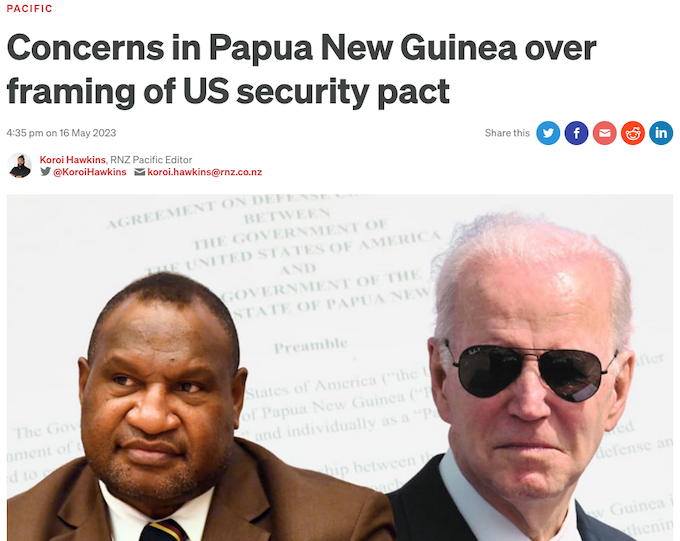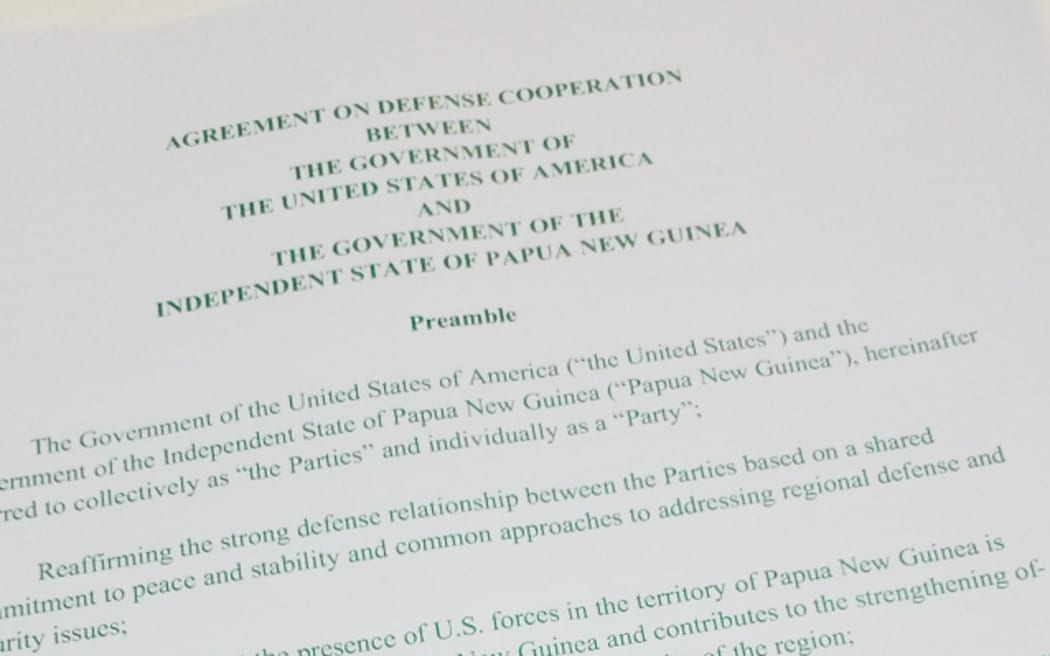
By Koroi Hawkins, RNZ Pacific editor
The United States is poised to sign a security pact with Papua New Guinea which would give US armed forces uninhibited access to PNG’s territorial waters and airspace.
There are concerns in PNG that the country will be dragged into the militarisation of the Pacific if it signs the deal with the US.
RNZ Pacific has seen a draft copy of an agreement that would have been signed off with US President Joe Biden due to make a historic visit to PNG next week on Monday. However, the trip has now been cancelled.
- READ MORE: Biden cancels visits to Australia and Papua New Guinea as US debt ceiling negotiations continue
- OPM leader calls on Biden to take proactive role in ending West Papuan ‘holocaust’
- Other PNG summit reports
The document outlines the terms and conditions for preferential access to various PNG sea and airports.
Article 10 of the draft pact states:
“Aircraft, vehicles, and vessels operated by or on behalf of US forces, may enter, exit, and move freely within the territory and territorial waters of Papua New Guinea with respect for the relevant rules of air, land, and maritime safety movement.
“Such aircraft, vehicles, and vessels shall be free from boarding and inspection without the consent of the US. Papua New Guinean authorities may grant blanket clearance for such aircraft, vehicles, and vessels in accordance with mutually agreed procedures.”
The PNG facilities the US is seeking access to include Lae Nadzab Airport, Lae Seaport, Lombrum Naval Base, Momote Airport on Los Negros Island in the Admiralty Islands, Jackson International Airport in the capital and the Port Moresby Seaport.

“Such Agreed Facilities and Areas may be used for mutually agreed activities including: visits; training; excercises, maneuvers; transit; support and related activities; refueling of aircraft; landing and recovery of aircraft; including aircraft that may conduct intelligence, surveillance and recconnaissance activities.”
It adds: “Bunkering of vessels; maintenance of vehicles, vessels, and aircraft; accommodation of personnel; communications; staging and deploying of forces and material; prepositioning of equipment, supplies, and material; security assistance and cooperation activities; joint and combined training activities; humanitarian and disaster relief; contingency operations; and other activities mutually agreed by the Parties of their Executive Agents.”
RNZ Pacific has also been told concerns are circulating within PNG government departments and agencies that the proposed deal may be unconstitutional.
Of particular concern are immunity clauses for US defence personnel operating in the country.
There are also fears that signing the pact will draw PNG into the militarisation of the region as it relates to the AUKUS security pact.
Signed by Australia, the United Kingdom and the United States, AUKUS will see Canberra forking out more than A$360 billion over three decades to acquire a fleet of nuclear submarines.
RNZ Pacific has sought comment from the White House and PNG Prime Minister James Marape’s office for comment.
This article is republished under a community partnership agreement with RNZ.










































